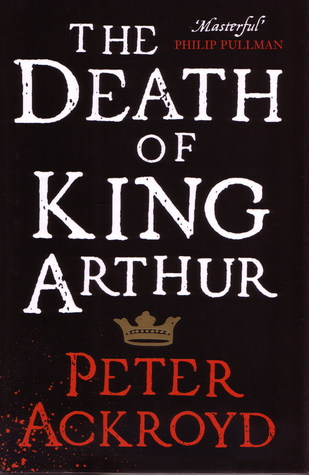The Death of King Arthur (by Peter Ackroyd)

I had been looking to dive into the stories of King Arthur/the Matter of Britain for a while, as part of my tour of English history and culture. I had tried Sir Thomas Malory's Le Morte d'Arthur but found it pretty much unreadable — it's around 1,000 pages and reads like the Bible — only finishing the first of 21 books (I think that's the number at least) before returning it.
What I wanted to read was the original stories, told as faithfully as possible, made readable. Reading into recommended books on the subject I kept coming across much-praised modern adaptations like T.H. White's The Once & Future King. People seem to like the fact its version of the stories was updated for what's described as a "post-WWII audience," but I'm not the least bit interested in that sort of modern adaptation. I just want the original stories (as far as we can take Malory's foundational work as the original).
It so happened to be that I had been reading Peter Ackroyd's History of England series, which I've enjoyed quite a bit, and found that he had produced this modern adaptation of the legend. What luck, because I don' t know if I would have found something as good otherwise. Ackroyd's The Death of King Arthur ("king" being added to the title for accuracy's sake, as he explains in the introduction) is exactly what I was looking for.
It's worth noting that other reader reviews I've found are a bit mixed. These are medieval stories unintended for modern tastes and sensibilities. Especially early on, the book reads like a straight modernization of the original text, and some readers may find it a bit dull for that reason. At the start, Arthur himself does less than you'd expect, mostly following the sage advice of Merlin, before being relegated to the background for most of the rest of the book. Personally, at this point, I was just happy to be able to read the original stories. It gets better too.
After the rise of Arthur comes the adventures of Lancelot, which was also felt a bit underwhelming to me, being mostly made up of him, the greatest knight in the world, destroying one opponent after another. It occurred to me on reading these stories that one advantage of modern storytelling is the use of dramatic tension, something missing a bit from this work (more early on, as we'll see). By the section on Tristram and Isolde (his spelling) though I was really getting into it.
I'm not entirely sure why but the writing seemed to improve throughout the book and the stories became more captivating. It may be that Ackroyd followed the original Malory in this, or for whatever reason decided to put more into it later on. I don't know, but there are nice poetic flourishes in these later chapters and some genuinely exciting stuff (I found Lancelot's escape after being confronted by Sir Gawain and several knights in Guinevere's bedchamber to be thrilling, for just one example).
The story ends very well, and it's nice that King Arthur gets a suitable end, after being absent from most of the story and repeatedly cucked by his strongest knight. *SPOILERS* Arthur leaves his illegitimate son Mordred (born as a product of his unintentional incest) in charge of his realm as he leads a force against Lancelot on the continent. Mordred declares Arthur dead and himself king. When Arthur returns civil war ensues, as a large share of the population has sided with Mordred for some reason (the book amusingly explains this as Englishmen being naturally fickle and in favor of change). After defeating Mordred's forces in a huge, bloody battle Arthur ignores his prophesied death he received in a vision and charges at Mordred, crying out "false traitor!" He fatally impales Mordred but not before he pulls himself towards Arthur on the spear and strikes a deadly blow against Arthur's head with his sword. Very cool.
I highly recommend this book for those looking to get into the Matter of Britain specifically, or just those who enjoy this sort of thing in general. There may be better-written adaptations of the legend available but their modernizations ruin the stories in my opinion. There could be other options out there for those looking for both a faithful adaptation and better writing, I don't know near enough to say, but this book is the best I've found.
